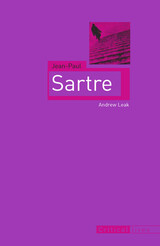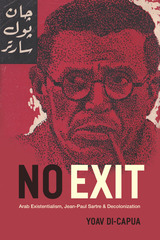3 books about Jean - Paul Sartre

Jean-Paul Sartre
Andrew Leak
Reaktion Books, 2006
“What I have just written is false. True. Neither true nor false, like everything one writes about madmen, about men.” With these sentences, Jean-Paul Sartre undermines the truthfulness of his own autobiography, Les Mots. Undeterred by such circumlocutions, Andrew Leak here cuts through Sartre’s own disavowals to unearth the man behind the literary and philosophical giant.
This biographical study integrates Sartre’s works into his personal life, revealing the intimate contexts in which his philosophy developed. From Sartre’s beginnings as a bright and precocious student, Leak explores how he struggled against the repressive strictures of bourgeois expectations, endured cruelty at the hands of schoolmates, and forged his conflicted personality within a fragmented family life. The book probes his particularly influential relationships with a range of people—from Simone de Beauvoir to Gaston Gallimard—and how Sartre was transformed by historical events, in particular his service in World War II.
Telling anecdotes, personal correspondence, and archival photographs expose how Sartre’s own challenges emerged as predominant themes in his works—such as the often blurred delineation between the real and imaginary, and his preoccupation with definitions of “madness” in the individual. Leak’s astute and provocative examination of Sartre himself challenges the philosopher’s assertion about the limits of knowledge of the other.
This biographical study integrates Sartre’s works into his personal life, revealing the intimate contexts in which his philosophy developed. From Sartre’s beginnings as a bright and precocious student, Leak explores how he struggled against the repressive strictures of bourgeois expectations, endured cruelty at the hands of schoolmates, and forged his conflicted personality within a fragmented family life. The book probes his particularly influential relationships with a range of people—from Simone de Beauvoir to Gaston Gallimard—and how Sartre was transformed by historical events, in particular his service in World War II.
Telling anecdotes, personal correspondence, and archival photographs expose how Sartre’s own challenges emerged as predominant themes in his works—such as the often blurred delineation between the real and imaginary, and his preoccupation with definitions of “madness” in the individual. Leak’s astute and provocative examination of Sartre himself challenges the philosopher’s assertion about the limits of knowledge of the other.
[more]

Jean-Paul Sartre
Hated Conscience of His Century, Volume 1: Protestant or Protester?
John Gerassi
University of Chicago Press, 1989
Countless biographers have tried to unveil the real Jean-Paul Sartre without his consent or cooperation. Only John Gerassi—the "non-godson" of Sartre, an atheist—was honored with the responsibility of being Sartre's official biographer. After drafting the commission with Sartre on the back of a menu at La Coupole, Gerassi recorded over one hundred hours of interviews with him between 1974 and 1979, and another hundred hours with Sartre's friends, colleagues, and enemies. Gerassi also immersed himself in Sartre's literary, philosophical, and personal writings. Gerassi had access to all of Sartre's files, unpublished manuscripts, and extensive notes for planned but undelivered lectures. Simone de Beauvoir gave many of Sartre's unpublished letters to Gerassi as well. Sartre trusted the integrity of Gerassi so completely that he considered Gerassi's biography to be the continuation of his own autobiography, Les mots. As a personal friend, Gerassi writes with advantages shared by no other biographer of Sartre.
[more]

No Exit
Arab Existentialism, Jean-Paul Sartre, and Decolonization
Yoav Di-Capua
University of Chicago Press, 2018
It is a curious and relatively little-known fact that for two decades—from the end of World War II until the late 1960s—existentialism’s most fertile ground outside of Europe was in the Middle East, and Jean-Paul Sartre was the Arab intelligentsia’s uncontested champion. In the Arab world, neither before nor since has another Western intellectual been so widely translated, debated, and celebrated.
By closely following the remarkable career of Arab existentialism, Yoav Di-Capua reconstructs the cosmopolitan milieu of the generation that tried to articulate a political and philosophical vision for an egalitarian postcolonial world. He tells this story by touring a fascinating selection of Arabic and Hebrew archives, including unpublished diaries and interviews. Tragically, the warm and hopeful relationships forged between Arab intellectuals, Sartre, Simone de Beauvoir, and others ended when, on the eve of the 1967 war, Sartre failed to embrace the Palestinian cause. Today, when the prospect of global ethical engagement seems to be slipping ever farther out of reach, No Exit provides a timely, humanistic account of the intellectual hopes, struggles, and victories that shaped the Arab experience of decolonization and a delightfully wide-ranging excavation of existentialism’s non-Western history.
By closely following the remarkable career of Arab existentialism, Yoav Di-Capua reconstructs the cosmopolitan milieu of the generation that tried to articulate a political and philosophical vision for an egalitarian postcolonial world. He tells this story by touring a fascinating selection of Arabic and Hebrew archives, including unpublished diaries and interviews. Tragically, the warm and hopeful relationships forged between Arab intellectuals, Sartre, Simone de Beauvoir, and others ended when, on the eve of the 1967 war, Sartre failed to embrace the Palestinian cause. Today, when the prospect of global ethical engagement seems to be slipping ever farther out of reach, No Exit provides a timely, humanistic account of the intellectual hopes, struggles, and victories that shaped the Arab experience of decolonization and a delightfully wide-ranging excavation of existentialism’s non-Western history.
[more]
READERS
Browse our collection.
PUBLISHERS
See BiblioVault's publisher services.
STUDENT SERVICES
Files for college accessibility offices.
UChicago Accessibility Resources
home | accessibility | search | about | contact us
BiblioVault ® 2001 - 2024
The University of Chicago Press









